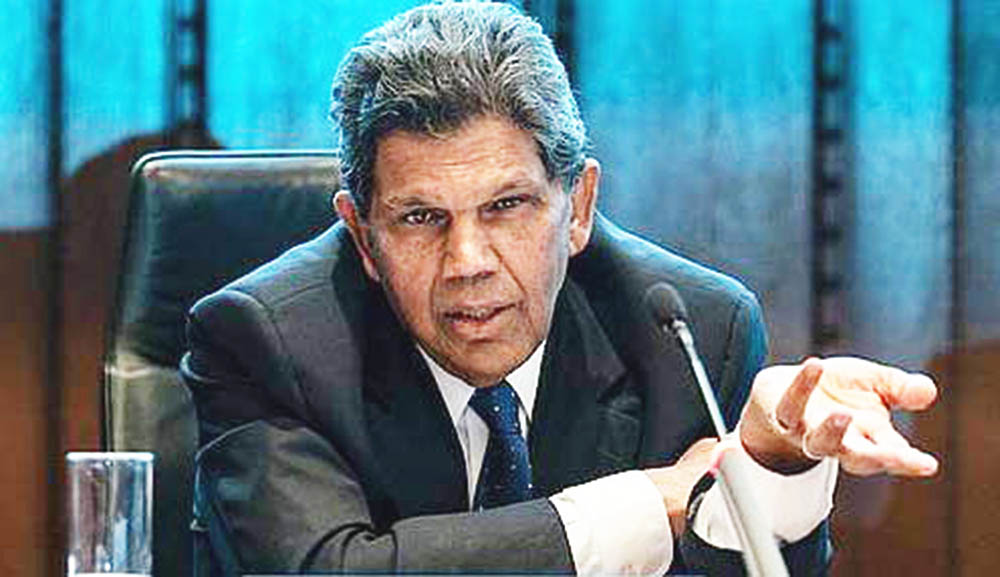By Dr. Bertrand Ramcharan, Seventh Chancellor of the
University of Guyana and erstwhile Fellow at Harvard University
As an emerging energy power, a forthcoming member of the UN Security Council, and with an energetic President reaching out internationally, Guyana now has a heightened role on the world stage. It is therefore timely for Guyanese to sharpen our insights into the major players and issues in international relations.
Keyu Jin, a Chinese-born, Harvard-educated academic, who is now Professor at the LSE, and straddles China, America and Europe, has just published an important book, The New China Playbook: Beyond Socialism and Capitalism. It has pertinent insights into Chinese perspectives on international relations.
Jin submits that as the Chinese economy comes of age, it is now running from a new playbook powered by a new generation. The new playbook is based on innovation, technology, self-reliance and mastery in an age marked by an unparalleled sense of national urgency and pride. Its rising middle-income group and new generation of consumers place high demands on civil society and standards of living.
China’s meritocratic heritage made possible the transition to modern governance easier, and unleashed China’s latent capacity to boost modern science and technology in the new era. China’s young, people, Jin continues, are big spenders, prodigious borrowers, and have a knack for lifestyle consumption. They have the potential to unleash trillions of dollars more into the global economy as they travel abroad, set global trends in fashion, and spend disproportionately more than their parents on culture and arts. Surveys indicate that they are substantially more open-minded and socially conscious than previous generations.
Jin draws a contrast between the free market economy of the West, and a hybrid Chinese economy. Government in the West, she notes, mainly influences the market through its fiscal, financial and monetary policies, whereas the Chinese government also applies industrial policies and management of its state-owned enterprises. The size of government is much larger in China, and government is an active participant in the Chinese hybrid economy.
The combination of state guidance at the macro-level and market mechanisms at the micro-level, she thinks, is what explains China’s rapid economic growth and its technological uptake in such a short span of time. She comments: “Although replicating China’s successful economic formula may not be possible for third world countries looking for a model to follow, there are still many lessons to absorb from the Chinese hybrid economy as an alternative to full-fledged capitalism. She emphasises: “A Chinese nation intent on its relentless pursuit of a prominent place in the developed world is one of the realities the rest of the world must recognize and come to terms with.”
Jin tells the story of China as a historically great country that has reinvented itself as a global power based on a unique melding of politics and economics. The power of the Chinese state is rooted in its ancient bureaucratic structure – an elaborate administrative structure that makes it possible for authorities at the top to convey instructions all the way down to the smallest unit: “The power of the state provides the system’s greatest potential and also poses its gravest inherent risk.”
Jin notes that China, for the last forty years, has been able to succeed in aligning economic incentives for all the key actors in the economy – individuals, households, firms, local governments, and the central authority. Macro-level national strategies get micro-level implementation based on successfully motivating local government officials to take an active role. Mandatory rotation of leaders at the provincial and municipal levels keeps officials from colluding against the central authority and from exploiting local firms for individual gain.
The central government’s power lies in its vast resources. It owns the land, its natural resources, and the nation’s largest banks. It controls the levers that set GDP growth targets, regulate financial systems, sway property markets, issue licenses and permits and distribute wealth. Reform is perhaps its most potent tool, allowing the central government to scrap old laws and impose new ones swiftly, with little political constraint.
The tendency to guide and manage the Chinese people stems from the nation’s deep history and culture of paternalism. The top priority of China’s paternalistic government is stability. The cultural strain of paternalism is still the key to understanding many of China’s policy decisions and stances. Compliance and paternalism still play major roles in China, as does a long-standing emphasis on education, diligence, and frugality. A tradition of placing community interests above personal interests stands in sharp contrast to the Western emphasis on the individual.
Multi-generational families often make decisions together and share the burden of housing and caring for older people. Culture also contributes to understanding of the deference to parents shown by Chinese children who are otherwise independent and may have chosen very different lifestyles.
Going forward, however, the logic that the government knows what’s best for its people, just as parents know what’s best for their children, will be challenged. As society evolves, people will express a greater preference for individual self-determination: “The grand test of China’s system in the future is how a medley of individual preferences can be reflected and aggregated into collective outcomes.”
Jin thinks that five significant considerations will shape the course of China’s next few decades. The first, and arguably the most significant, is the ‘social problem’, namely the urgency of addressing issues ranging from enlarging the middle-income group, to consumer protection, to the appropriate degree of state provision. China’s income inequality has widened. Although China is not looking to provide a universal basic income (its traditional values encourage hard work as the basis of a meaningful life), the Chinese state does feel duty bound to provide a basic level of well-being for all its people.
China’s first steps have been directed at getting rid of sources of blatantly illicit incomes, those made by defrauding, monopolising, manipulating, or colluding. China is rolling out affordable housing and prioritizing access to healthcare and efficient infrastructure for everyone. In China’s changing economic environment, companies have to be disciplined, environmentally conscious, and considerate to their customers.
The second force influencing developments in China is that the country is shedding its status as a young nation as its economy comes of age. As a people become better off, their desire to meet basic needs gives way to longings for work-life balance and access to a wide variety of high-quality goods and services. For society as a whole, process becomes as important as outcomes.
The state, including local governments, will need to recede to the background while letting markets and entrepreneurs do the work. To reflect what the people want, rather than what the state thinks they should want, paternalism will need to give way to greater political representation for all. New mechanisms will need to supplant old ones, but they are not yet part of the new playbook.
The third powerful influence on China’s future concerns two goals China has set for itself: to become the preeminent economic power as measured by GDP and a desire to influence global rules and norms and to build a vast number of economic linkages where they are welcomed. Shared prosperity through economic development and cooperation is an important part of China’s world vision.
The fourth factor at work shaping China’s future is a need that it shares with the United States – that the world’s two economic superpowers peacefully and cooperatively accommodate each other. Jin writes: “We can only hope that China and the US, for all their political differences and competitiveness, will actively seek space for collaboration. This is especially true where their need for each other is obvious, as it is in the arenas of climate crisis mitigation and the advancement of peaceful resolution to disputes between nations. Both countries will have to figure out not only what the other wants but also what is realistically possible to achieve. For China, it would be unrealistic to seek to displace the US as the world’s sole superpower. For the US, it would be fanciful to assume that its economic and military hegemony will extend into the indefinite future.”
Jin adds that a sensible approach would call for both nations to look after their own security while respecting each other’s needs and desires, and for an ongoing dialogue about shared global challenges that will gradually bring the two nations closer together. This is a model for coexistence.
Fifth, and finally, Jin writes that, for all that China is unlikely to evolve into a Western-style democracy, its people are increasingly becoming attuned to a social and legal environment that considers and protects their legitimate rights. They are holding their local governments more and more accountable for their roles in people’s daily lives, using social media, public postings on government websites, and civil court cases to express their views and press for change. Under the Administrative Procedure Law, the people can sue governmental institutions for infringement on their personal rights, and do win civil court cases. The version of the law codified in 2021 marks a new milestone in improving the rule of law. In that ongoing dynamic of the state evolving with the people, the people will take on an increasingly assertive role.
Guyana would be wise, on the world stage, to embrace Jin’s advice that a sensible approach would call for China and the USA to look after their own security while respecting each other’s needs and desires, and for an ongoing dialogue about shared global challenges that will gradually bring the two nations closer together. As a land of many peoples, dialogue is important for Guyana. As a participant on the world stage, Guyana’s contribution to global dialogue can be its defining contribution.









